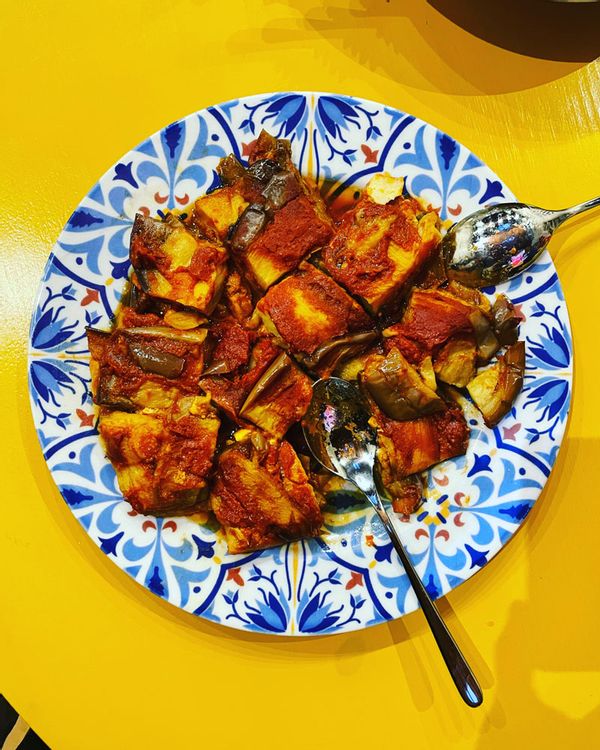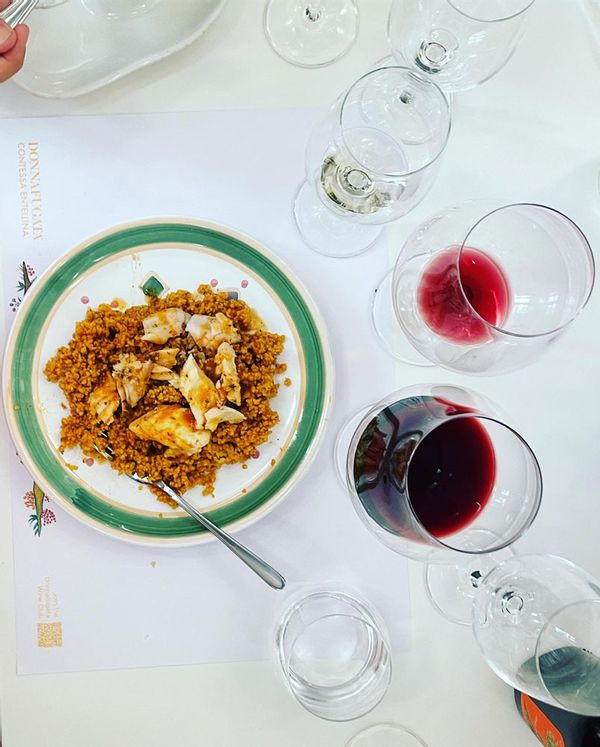
I'm not quite sure why I cook like a Sicilian; I'm not one ounce Sicilian, for one thing. My family tree is half Irish, the rest German and Croatian. Nor had I ever visited Sicily, the volcanic island jewel just off Italy's southern coast, until this summer. But somehow I've cobbled together a home-cooked diet over 39 years that mirrors that of many Sicilians: lots of tuna and oily fishes in starring and supporting roles, a love of minimalist pasta- and grain-based dishes, nutty pestos, capers, and savory uses of dried fruit, of slow-cooked squashes, tomatoes and eggplant.
A few of these tendencies I can explain. I cook eggplant parm sort of like a Sicilian because my German immigrant grandmother had an immigrant neighbor from southern Italy with whom she swapped recipes. My grandmother also cultivated a massive garden that forever imprinted a love — ahem, compulsion? — to incorporate seasonal produce into every meal, which she passed to my mom. I started tossing tinned sardines with pasta and oil-fried breadcrumbs around 2010 because Mark Bittman did, for "The New York Times" dining section. Soon enough, this led to topping things like braised veggies and pan-fried oily fish with breadcrumbs too.
Yet for the most part, every time I opened a restaurant menu throughout Sicily and Pantelleria, the tiny island almost halfway to Tunisia, I felt like I was bumping into a dear friend in an unexpected place.
Sicilian cuisine, like its history, is characterized by long centuries of foreign dominations, starting with Corinthian colonists who arrived from Greece in 734 B.C. and planted hazelnuts, vineyards and olive trees. Then came the Romans who brought hard durum wheat, and the Arabs who introduced sherbet, couscous and eggplant, not to mention a penchant for stuffed foods, pistachios and spices like saffron and cinnamon. Spanish rule brought tomatoes and chocolate to Sicilian pantries, while shipments of prickly pear cactus from the New World began a tradition of eating the fruit raw after meals that continues in Sicily today.
It's a remarkably rich larder, whose origin story made me reflect on the development of my own cooking style. Why do certain ingredients and cooking methods imprint on us more than others?
Of course, Americans as a whole can't seem to get enough of Italian food, wine and culture. Some of this can be explained by the fact that approximately 17 million people of Italian ancestry live in the U.S., and about one-eighth of U.S. restaurants serve Italian food. Italy likewise remains a beacon of aspirational travel for Americans. According to a 2019 survey by vacation home rental company Vrbo, Italy was the top dream destination among millennial travelers ages 18 to 34 by more than 9 percent (travelers 35 and over chose Australia). Food and travel networks have continued to bank on our fascination with Italy by feeding us a steady diet of stars from Giada de Laurentiis (Food Network's "Giada in Italy") and Stanley Tucci (CNN's "Searching for Italy") to Phil Rosenthal ("Somebody Feed Phil") romping around the boot in a FOMO-inducing feedback loop.
It's a disservice in many ways to repeatedly uplift places that are already so familiar, capitalizing on our inherent risk aversion. There are plenty of other places that merit our attention and hardwon disposable income. Yet travel is intimidating to many. Why not edge out into the world on a comforting foundation of pasta and pizza?
It's also beautiful, irresistible even, to visit a place far from home and feel so connected to it. I'll never forget my first tastes of squid tartare and caponata packed with eggplant, tomatoes and capers in vinegary, sweet sauce — when I realized I'd found my kindred cooking spirit. From there, every bite was a tiny, jubilant revelation.
In Marsala, I went back for seconds then thirds of Ristorante I Bucanieri's eggplant parm, trying to unriddle its confoundingly luxe texture. I later learned from chef Nino Chirco that the vegetable is painstakingly coaxed from raw to silkily tender over three and a half hours in a low oven between layers of sweet tomato sauce, basil, hard-cooked eggs and parmesan.

I dragged fried anchovies through caper mayonnaise at the seaside osteria El Principe e il pirata in Pantelleria, reveling in the rare chance to eat them in a form other than packed in oil or salt, which is how I most often use them.

One pasta dish in particular, at Ristorante Le Lumie in Marsala, captivated me such that I rudely opened the notes app in my phone, mid-bite, to get it down: "6/7/23: pistachio, tuna, mint, pasta."
It was savory yet delicate; bright, rich and textural; new yet so familiar, like unlocking a memory that had been just out of reach my whole life. I couldn't wait to recreate it in my own kitchen, to pocket another edible treasure from this place whose food feels like coming home 5,000-odd miles away.
Salon Food writes about stuff we think you'll like. While our editorial team independently selected these products, Salon has affiliate partnerships, so making a purchase through our links may earn us a commission.







